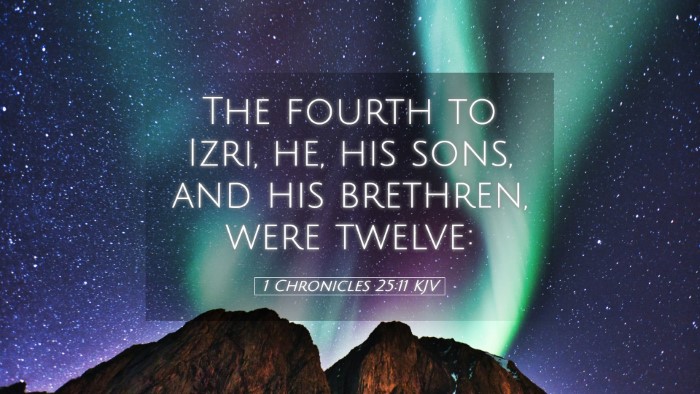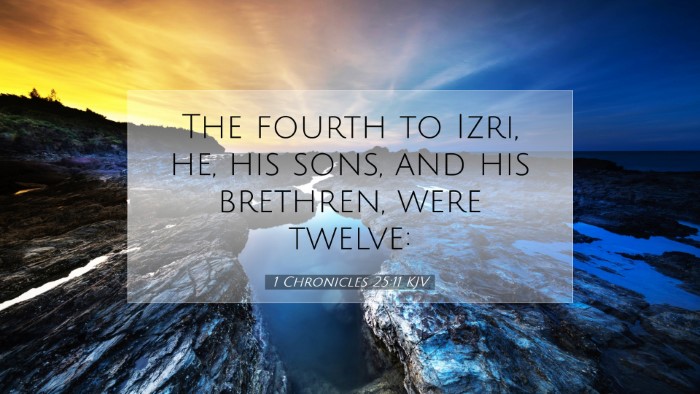Commentary on 1 Chronicles 25:11
In 1 Chronicles 25:11, we find a significant organizational aspect of the Levitical worship, particularly focusing on the division of musicians. This chapter provides insights into the structure of the worship ministry during the reign of King David.
Text of the Verse
“The twelfth to Hakkkoz, with his sons and his brethren, were twelve.” (1 Chronicles 25:11)
Historical Context
The book of Chronicles was mainly written to provide a theological history of the nation of Israel, focusing on worship and the importance of the Davidic covenant. The mention of Hakkkoz as a division within the musicians signifies the Lord’s special attention toward established order in worship.
Insights from Public Domain Commentaries
Matthew Henry's Commentary
Matthew Henry emphasizes the importance of unity and harmony in worship, suggesting that the ordered arrangement of these musicians reflects a deeper theological principle: God is a God of order and beauty. He points out that the divisions among the musicians were not arbitrary but divinely inspired to ensure that worship was conducted effectively and pleasingly to God.
Henry further elaborates that by assigning a specific role to each Levitical musician, God illustrates the need for each member of the congregation to contribute to the spiritual life of the community. Each division, including the twelve assigned to Hakkkoz, underscores the notion that everyone has a vital part to play in worship.
Albert Barnes' Notes on the Bible
Albert Barnes offers a detailed analysis of the Levitical structures and highlights the representation of numbers in biblical texts. He notes that the number twelve often signifies completeness and may represent the twelve tribes of Israel. The assignment of twelve musicians to Hakkkoz could symbolize a holistic approach to worship that encapsulates the entire nation in praise before God.
Barnes also reflects on the critical role that music played in the worship experience of the Israelites. He asserts that music has the power to elevate the soul and engage the heart in divine adoration, making these divisions of musicians essential for an effective worship experience.
Adam Clarke's Commentary
Adam Clarke focuses on the historical significance of the musicians mentioned in this verse. He indicates that the establishment of such musical leaders marks a pivotal moment in Israel’s worship history, where music transitioned from a communal activity to an organized ministry within the temple structure. This transition is significant in understanding the evolution of worship in ancient Israel.
Moreover, Clarke points out that the reference to specific leaders and their music divisions establishes a precedent for future worship practices. This precedent showcases the planning and seriousness with which the Levitical ministry approached their sacred duties, underpinning the notion that structured worship is pleasing to the Lord.
Theological Implications
The assignment of musicians, including Hakkkoz and his division, provides several theological implications for contemporary worship:
- Orderliness in Worship: God desires worship to be systematic, reflecting His nature as a God of order.
- Community Engagement: Each division points to the importance of community in worship; everyone has a role to play, emphasizing inclusion in the body of Christ.
- Devotion through Music: The text implies that music is more than a mere addition to worship; it is a vital element that enhances the spiritual experience.
Practical Applications for Pastors and Worship Leaders
For pastors and church leaders, this passage serves as a reminder to cultivate an intentional approach to worship. Here are a few applications:
- Encourage Participation: Engage different members of the congregation in worship, ensuring that each person feels valued and part of the whole.
- Maintain Structure: While spontaneity can be significant in worship, maintaining a structure helps reinforce discipline and reverence.
- Incorporate Music Thoughtfully: Recognize the power of worship music to transform lives and create an environment that invites God’s presence.
Conclusion
1 Chronicles 25:11 is a concise yet profound verse that encapsulates the ordered nature of worship as ordained by God. Insights from Matthew Henry, Albert Barnes, and Adam Clarke provide a window into understanding the significance of worship, music, and community within the context of ancient Israel. As we extract lessons from this scripture, it is vital for modern believers to appreciate the importance of organization, participation, and the transformative power of music in our approach to worship.


